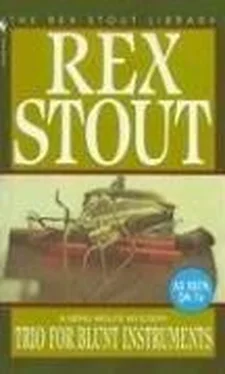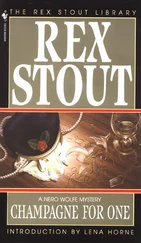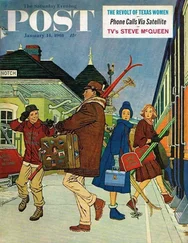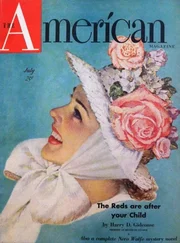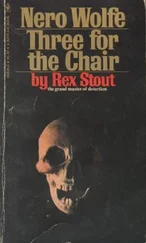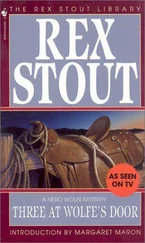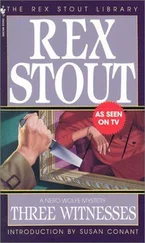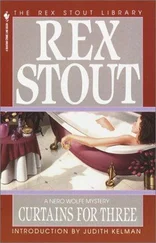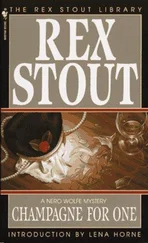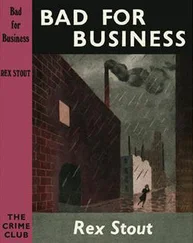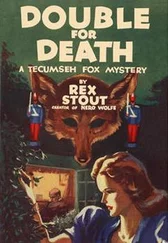Rex Stout - Trio for Blunt Instruments
Здесь есть возможность читать онлайн «Rex Stout - Trio for Blunt Instruments» весь текст электронной книги совершенно бесплатно (целиком полную версию без сокращений). В некоторых случаях можно слушать аудио, скачать через торрент в формате fb2 и присутствует краткое содержание. Жанр: Старинная литература, en-GB. Описание произведения, (предисловие) а так же отзывы посетителей доступны на портале библиотеки ЛибКат.
- Название:Trio for Blunt Instruments
- Автор:
- Жанр:
- Год:неизвестен
- ISBN:нет данных
- Рейтинг книги:5 / 5. Голосов: 1
-
Избранное:Добавить в избранное
- Отзывы:
-
Ваша оценка:
- 100
- 1
- 2
- 3
- 4
- 5
Trio for Blunt Instruments: краткое содержание, описание и аннотация
Предлагаем к чтению аннотацию, описание, краткое содержание или предисловие (зависит от того, что написал сам автор книги «Trio for Blunt Instruments»). Если вы не нашли необходимую информацию о книге — напишите в комментариях, мы постараемся отыскать её.
Trio for Blunt Instruments — читать онлайн бесплатно полную книгу (весь текст) целиком
Ниже представлен текст книги, разбитый по страницам. Система сохранения места последней прочитанной страницы, позволяет с удобством читать онлайн бесплатно книгу «Trio for Blunt Instruments», без необходимости каждый раз заново искать на чём Вы остановились. Поставьте закладку, и сможете в любой момент перейти на страницу, на которой закончили чтение.
Интервал:
Закладка:
I stopped because Wolfe was moving. Cramer had dropped the ear of corn onto Wolfe’s desk, and Wolfe had picked it up and felt it, gripping it in the middle, and now he was shucking it. From where I sat, at my desk, the rows of kernels looked too big, too yellow, and too crowded. Wolfe frowned at it, muttered, “I thought so,” put it down, stood up, reached for the carton, said, “You will help, Archie,” took an ear, and started shucking it. As I got up Cramer said something but was ignored.
When we finished we had three piles, as assorted by Wolfe. Two ears were too young, six were too old, and eight were just right. He returned to his chair, looked at Cramer, and declared, “This is preposterous.”
“So you’re stalling,” Cramer growled.
“No. Shall I expound it?”
“Yeah. Go ahead.”
“Since you have questioned men at the restaurant, you know that the corn comes from a man named Duncan McLeod, who grows it on a farm some sixty miles north of here. He has been supplying it for four years, and he knows precisely what I require. It must be nearly mature, but not quite, and it must be picked not more than three hours before it reaches me. Do you eat sweet corn?”
“Yes. You’re stalling.”
“No. Who cooks it?”
“My wife. I haven’t got a Fritz.”
“Does she cook it in water?”
“Sure. Is yours cooked in beer?”
“No. Millions of American women, and some men, commit that outrage every summer day. They are turning a superb treat into mere provender. Shucked and boiled in water, sweet corn is edible and nutritious; roasted in the husk in the hottest possible oven for forty minutes, shucked at the table, and buttered and salted, nothing else, it is ambrosia. No chef’s ingenuity and imagination have ever created a finer dish. American women should themselves be boiled in water. Ideally the corn-”
“How much longer are you going to stall?”
“I’m not stalling. Ideally the corn should go straight from the stalk to the oven, but of course that’s impractical for city dwellers. If it’s picked at the right stage of development it is still a treat for the palate after twenty-four hours, or even forty-eight; I have tried it. But look at this.” Wolfe pointed to the assorted piles. “This is preposterous. Mr. McLeod knows better. The first year I had him send two dozen ears, and I returned those that were not acceptable. He knows what I require, and he knows how to choose it without opening the husk. He is supposed to be equally meticulous with the supply for the restaurant, but I doubt if he is; they take fifteen to twenty dozen. Are they serving what they got today?”
“Yes. They’ve admitted that they took it from the station wagon even before they reported the body.” Cramer’s chin was down, and his eyes were narrowed under the eyebrow hedge. “You’re the boss at that restaurant.”
Wolfe shook his head. “Not the boss. My trusteeship, under the will of my friend Marko Vukcic when he died, will end next year. You know the arrangement; you investigated the murder; you may remember that I brought the murderer back from Yugoslavia.”
“Yeah. Maybe I never thanked you.” Cramer’s eyes came to me. “You go there fairly often-not to Yugoslavia, to Rusterman’s. How often?”
I raised one brow. That annoys him because he can’t do it. “Oh, once a week, sometimes twice. I have privileges, and it’s the best restaurant in New York.”
“Sure. Were you there today?”
“No.”
“Where were you at five-fifteen this afternoon?”
“In the Heron sedan which Mr. Wolfe owns and I drive. Five-fifteen? Grand Concourse, headed for the East River Drive.”
“Who was with you?”
“Saul Panzer.”
He grunted. “You and Wolfe are the only two men alive Panzer would lie for. Where had you been?”
“Ball game. Yankee Stadium.”
“What happened in the ninth inning?” He flipped a hand. “To hell with it. You’d know all right, you’d see to that. How well do you know Max Maslow?”
I raised the brow again. “Connect it, please.”
“I’m investigating a murder.”
“So I gathered. And apparently I’m a suspect. Connect it.”
“One item in Kenneth Faber’s pockets was a little notebook. One page had the names of four men written in pencil. Three of the names had checkmarks in front of them. The last one, no checkmark, was Archie Goodwin. The first one was Max Maslow. Will that do?”
“I’d rather see the notebook.”
“It’s at the laboratory.” His voice went up a notch. “Look, Goodwin. You’re a licensed private detective.”
I nodded. “But that crack about who Saul Panzer would lie for. Okay, I’ll file it. I don’t know any Max Maslow and have never heard the name before. The other two names with checkmarks?”
“Peter Jay. J-A-Y.”
“Don’t know him and never heard of him.”
“Carl Heydt.” He spelled it.
“That’s better. Couturier?”
“He makes clothes for women.”
“Including a friend of mine, Miss Lily Rowan. I have gone with her a few times to his place to help her decide. His suits and dresses come high, but I suppose he’d turn out a little apron for three Cs.”
“How well do you know him?”
“Not well at all. I call him Carl, but you know how that is. We have been fellow weekend guests at Miss Rowan’s place in the country a couple of times. I have seen him only when I have been with Miss Rowan.”
“Do you know why his name would be in Faber’s notebook with a checkmark?”
“I don’t know and I couldn’t guess.”
“Do you want me to connect Susan McLeod before I ask you about her?”
I had supposed that would be coming as soon as I heard the name Carl Heydt, since the cops had had the notebook for four hours and had certainly lost no time making contacts. Saving me for the last, and Cramer himself coming, was of course a compliment, but more for Wolfe than for me.
“No, thanks,” I told him. “I’ll do the connecting. The first time Kenneth Faber came with the corn, six weeks ago today, the first time I ever saw him, he told me Sue McLeod had got her father to give him a job on the farm. He was very chatty. He said he was a freelance cartoonist, and the cartoon business was in a slump, and he wanted some sun and air and his muscles needed exercise, and Sue often spent weekends at the farm and that would be nice. You can’t beat that for a connection. Go ahead and ask me about Susan McLeod.”
Cramer was eying me. “You’re never slow, are you, Goodwin?”
I gave him a grin. “Slow as cold honey. But I try hard to keep up.”
“Don’t overdo. How long have you been intimate with her?”
“Well. There are several definitions for ‘intimate.’ Which one?”
“You know damn well which one.”
My shoulders went up. “If you won’t say, I’ll have to guess.” The shoulders went down. “If you mean the very worst, or the very best, depending on how you look at it, nothing doing. I have known her three years, having met her when she brought the corn one day. Have you seen her?”
Читать дальшеИнтервал:
Закладка:
Похожие книги на «Trio for Blunt Instruments»
Представляем Вашему вниманию похожие книги на «Trio for Blunt Instruments» списком для выбора. Мы отобрали схожую по названию и смыслу литературу в надежде предоставить читателям больше вариантов отыскать новые, интересные, ещё непрочитанные произведения.
Обсуждение, отзывы о книге «Trio for Blunt Instruments» и просто собственные мнения читателей. Оставьте ваши комментарии, напишите, что Вы думаете о произведении, его смысле или главных героях. Укажите что конкретно понравилось, а что нет, и почему Вы так считаете.
